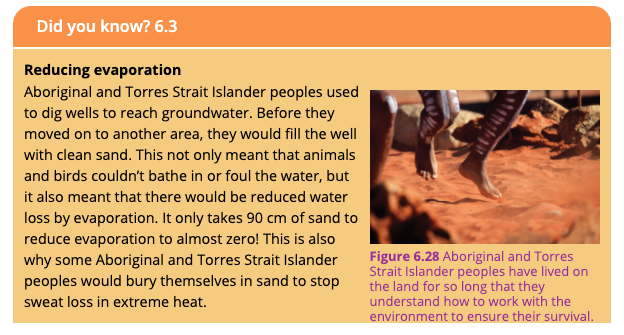NEWS
Science learning for all
Contributing author, Gemma Dale, talks about how the unique approach of the new Cambridge Science for Queensland series will enable ALL students to engage with science
Encouraging students to make connections, self-assess and gain a deeper understanding
Many textbooks are written with the idea that the student is simply going to read and absorb knowledge. However, this is not an effective way of learning. Our textbooks follow Marzano’s model of teaching effectiveness and have been designed so students can actively construct knowledge by connecting new concepts to existing knowledge. Mixing content, activities and questions help students make connections between what they already know and the new content that teachers want them to learn.
Several features within the textbooks enable students to guide and direct their own learning. Not every student follows the same learning trajectory. Some require simple explanatory paragraphs, others require examples, and some may need to define keywords as a starting point. Textbooks need to be designed to support these different learning journeys, and Cambridge Science for Queensland fulfils this. Activities regularly dispersed throughout the chapters allow students to test themselves and practise applying their new ideas.
No matter the journey, students still need to know their learning outcomes. Concept maps and chapter reviews allow students to identify what they should know or be able to do on completion of the chapter. Alongside clearly labelled subsections and regular opportunities for formative assessment, concept maps and chapter reviews allow students to develop a deeper level of understanding.
A 2010 study found that female students perform better in science when images in their textbooks include women scientists. We have increased female inclusion wherever possible, including both historic explanations and current developments in science.
Efforts have also been made to improve the teaching of Aboriginal and Torres Strait Islander content. The current Australian Curriculum contains prescribed Aboriginal and Torres Strait Islander content that was developed to disperse the inconsistencies associated with teaching Aboriginal perspectives. Aboriginal and Torres Strait Islander peoples have unique knowledge systems that can contribute to all fields of scientific endeavour, including the management of Australia's natural resources. Cambridge Science for Queensland has respectfully covered each syllabus elaboration, often combining it with a Queensland-specific example.
Innovative digital resources for today’s classrooms
We are in the middle of a fundamental educational shift from print-based literacy to an increasing level of multimodal literacy. This involves a combination of words, images and videos. The principle idea behind this is that learning is active, not passive. Our understanding of the importance of this increased during the brief lockdown that Queensland went through as a result of COVID-19 that saw teachers tasked with providing activities that would both educate and engage. Videos, widgets, interactive learning opportunities and fluid useability of the interactive resources enable clarification and extension of knowledge. Providing access to the suggested answers gives greater autonomy to students in their self-assessment, an extremely valuable process that allows students to develop self-reflection and critique; and ultimately, how to be responsible for their own learning. Unlike teacher assessment, self-assessment provides greater opportunity for students to become more autonomous learners who are more aware of their strengths and weaknesses.
More information on the Cambridge Science for Queensland resources can be found here.

